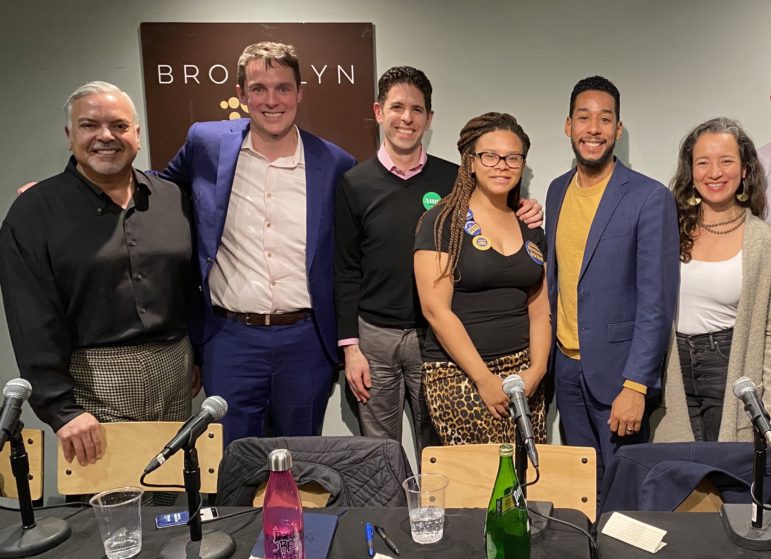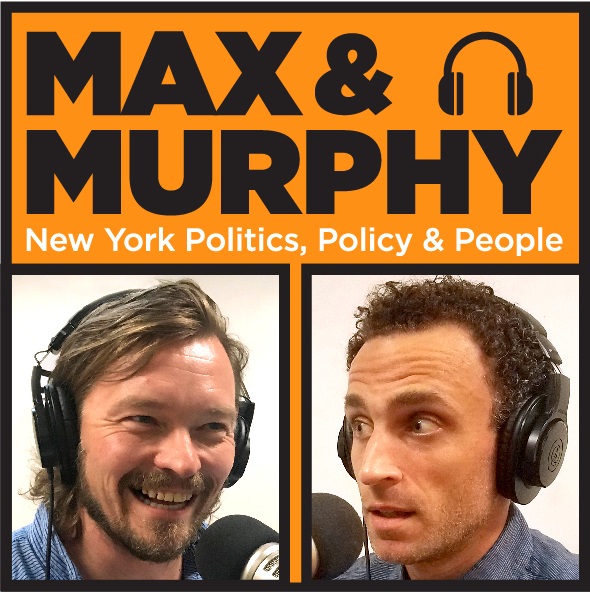
Anika Chowdhury
NYC-based supporters of the Democratic presidential field: (l to r) Henry Munoz III for Biden, Chris Coffey for Bloomberg, Aaron Mendelsohn for Klobuchar, Tristian Thomas-Allen for Buttigieg, Antonio Reynoso for Warren and Ana Maria Archila for Sanders.Reliably blue over the past 36 years, New York state doesn’t play a suspenseful role in presidential elections. Its electoral votes can be penciled into the Democratic column, since every Democratic candidate since Bill Clinton has enjoyed at least a million-vote margin in the Empire State on Election Day.
Primary Day can be different. In 1992, New York all but ended Jerry Brown’s hopes of stopping Clinton’s roll toward the nomination. Eight years later, Bill Bradley hoped for a big win in the city and state where he’d been an NBA star, but Al Gore’s easy victory began the end of Bradley’s candidacy. And New York is where Bernie Sanders hoped to upset Hillary Clinton in 2016; he fell short, and after that result Clinton began to mop up the delegates needed to get nominated in Philadelphia.
This year, New York State votes very late in the process—eight weeks after Super Tuesday. So, the whole thing could effectively be over by then. Or, New York (which votes the same day as Connecticut, Delaware, Maryland, Pennsylvania and Rhode Island) could be the decisive chapter in the primary saga.
Whether they get a chance to cast a meaningful primary ballot or not, many New Yorkers are heavily invested in the campaign. They donate money, attend rallies, phone bank, travel to other states to knock on doors, and go toe-to-toe with other factions over Twitter.
With that in mind, WBAI’s Max & Murphy Show this week invited local surrogates for and supporters of the six main Democratic candidates to talk about why they think their woman (or man) has the best shot to beat President Trump and the best message for their fellow New Yorkers.
Councilmember Antonio Reynoso came as a supporter of Sen. Elizabeth Warren. Sanders was represented by the Center for Popular Democracy’s Ana Maria Archila. Chris Coffey of Tusk Ventures made the case for former Mayor Mike Bloomberg, and Aaron Mendelsohn was on hand as Amy (Klobuchar) for America’s Authorized Representative in New York State. Brooklyn resident Tristian Thomas-Allen spoke for Pete Buttigieg and Henry Munoz III, CEO of Kell Munoz Architects, Inc. and chair of the National Finance Committee for the Democratic National Committee from 2017-2019, was there as a Joe Biden backer.
“It comes down to healthcare,” Munoz said when asked what Biden’s top issue is. “If I have to think about whether I have to put food on the table or buy a prescription for my child I guarantee I know what I’m going to be doing that evening. What sets him apart from the field is the ability and the experience of having worked in the Congress. Somebody who has sat in the administration for eight years who has passed significant legislation to move this country forward.”
Coffey stressed Bloomberg’s “electability,” saying, “He is going to get the independent votes because he’s been someone who has not been married to a party and there are a lot of independents that we’re going to need to win this race who we did not have in 2016. They either stayed home or they voted for Donald Trump.” Coffey also compared Trump’s handling of the coronavirus to Bloomberg’s record on public health.
Eyeing the general election debates that will come later in the year, Reynoso praised Warren’s work against Bloomberg in their recent on-stage encounters: “She did a great job at being able to-eviscerate a billionaire on the debate stage in Nevada. We need someone that will be willing to stand up to people like Trump and show them that their way of doing business is not the way that the American people want. I’m looking forward to being able to see somebody that’s a fighter, on stage, taking on someone like Donald Trump.”
Archila argued that Sanders has teed up the issues that the other Democratic candidates have now coalesced around. “Bernie Sanders has been steadfast and a visionary imagining that we can have a country where everyone has healthcare and he has been the person that has brought the entire field to this position,” she said. “The fact that healthcare is a dominant issue in this election and that everyone is trying to distinguish or match Bernie Sanders’ Medicare for All proposal can tell you that the contributions that he has made to actually trying to shape the debate inside the Democratic party so that people can see themselves in the party and in its vision.”
Asked if they had any advice for their preferred candidates, Mendelsohn recalled an encounter with Klobuchar, for whom he has worked for decades.
“My wife gave birth to our daughter three weeks early in November and our daughter was in the NICU for several nights and I happened to be sitting with her watching our baby who was two days old and I got a call on my cell phone with a Minnesota number, and I thought it was spam,” he said. “So, I handed it to my wife and my wife answered the phone and it was Senator Klobuchar. It wasn’t a surrogate. It wasn’t her assistant. It was Senator Klobuchar calling my wife to see how she was doing and to see how Rosy was doing because Senator Klobuchar had the exact same experience with her daughter.”
“I would just say she should continue to relate to people, the issues that confront people every day.”








